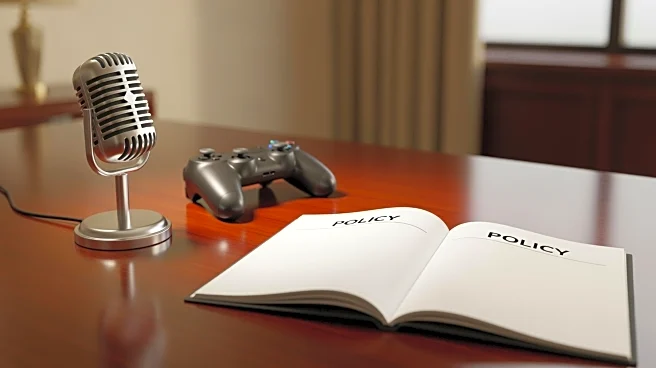What's Happening?
Activision Blizzard's latest release, Call of Duty: Black Ops 7, has sparked controversy due to its use of AI-generated images within the game. Players have expressed dissatisfaction with the AI-generated calling
card images, which resemble Studio Ghibli-style art. In response, U.S. Congressman Ro Khanna has criticized the company's reliance on AI, arguing that it is used to maximize profits at the expense of jobs. Khanna advocates for regulations that prevent companies from using AI to displace workers and suggests that artists should have a say in AI deployment and share in the profits. He also proposes tax reforms to discourage excessive automation and supports union efforts to ensure workers benefit from productivity gains.
Why It's Important?
The debate over AI's role in the workplace is gaining traction as industries increasingly adopt automation technologies. Khanna's comments highlight concerns about job displacement and the need for regulatory frameworks to protect workers. The gaming industry, known for its creative workforce, faces unique challenges as AI tools become more prevalent. This situation underscores the broader implications of AI on employment and the economy, as well as the importance of balancing innovation with job security. Stakeholders, including policymakers and labor unions, are likely to engage in discussions about how to integrate AI responsibly while safeguarding employment opportunities.
What's Next?
The controversy surrounding AI in gaming may prompt further scrutiny of AI practices across industries. Policymakers could consider introducing legislation to regulate AI usage and protect jobs, potentially leading to new standards for AI deployment. Companies might face pressure to involve employees in decision-making processes related to AI and to ensure fair distribution of profits generated by AI-driven productivity. The gaming community and industry leaders may also engage in dialogue about ethical AI use and its impact on creativity and employment.
Beyond the Headlines
The ethical implications of AI in creative industries raise questions about the future of artistic expression and the role of human creativity. As AI tools become more sophisticated, the distinction between human and machine-generated art blurs, challenging traditional notions of authorship and originality. This development could lead to a reevaluation of intellectual property rights and the value placed on human creativity in the digital age.









